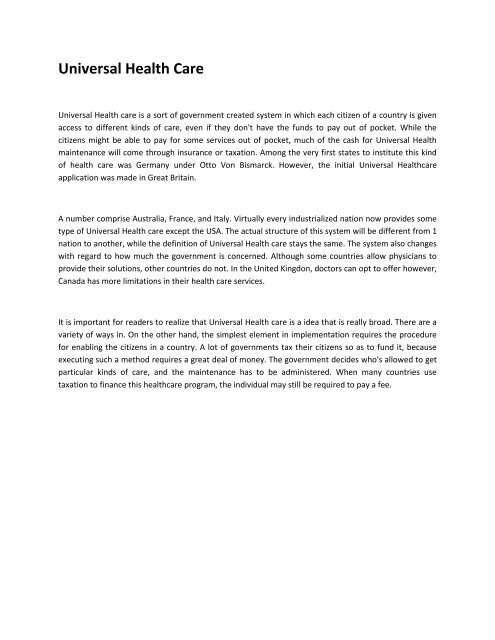Universal Health Care
Create successful ePaper yourself
Turn your PDF publications into a flip-book with our unique Google optimized e-Paper software.
<strong>Universal</strong> <strong>Health</strong> <strong>Care</strong><br />
<strong>Universal</strong> <strong>Health</strong> care is a sort of government created system in which each citizen of a country is given<br />
access to different kinds of care, even if they don't have the funds to pay out of pocket. While the<br />
citizens might be able to pay for some services out of pocket, much of the cash for <strong>Universal</strong> <strong>Health</strong><br />
maintenance will come through insurance or taxation. Among the very first states to institute this kind<br />
of health care was Germany under Otto Von Bismarck. However, the initial <strong>Universal</strong> <strong>Health</strong>care<br />
application was made in Great Britain.<br />
A number comprise Australia, France, and Italy. Virtually every industrialized nation now provides some<br />
type of <strong>Universal</strong> <strong>Health</strong> care except the USA. The actual structure of this system will be different from 1<br />
nation to another, while the definition of <strong>Universal</strong> <strong>Health</strong> care stays the same. The system also changes<br />
with regard to how much the government is concerned. Although some countries allow physicians to<br />
provide their solutions, other countries do not. In the United Kingdon, doctors can opt to offer however,<br />
Canada has more limitations in their health care services.<br />
It is important for readers to realize that <strong>Universal</strong> <strong>Health</strong> care is a idea that is really broad. There are a<br />
variety of ways in. On the other hand, the simplest element in implementation requires the procedure<br />
for enabling the citizens in a country. A lot of governments tax their citizens so as to fund it, because<br />
executing such a method requires a great deal of money. The government decides who's allowed to get<br />
particular kinds of care, and the maintenance has to be administered. When many countries use<br />
taxation to finance this healthcare program, the individual may still be required to pay a fee.
Some citizens and politicians in the United States have proposed the introduction of a method in their<br />
own country, Since the <strong>Universal</strong> <strong>Health</strong> care program has functioned so well in several nations.<br />
American proponents of all <strong>Universal</strong> <strong>Health</strong> care are fast to point in the cost of insurance as evidence<br />
that <strong>Universal</strong> <strong>Health</strong>care could work. Indeed, if they become ill or hurt, and the price of health<br />
insurance from the USA has gotten so large that millions of Americans go without health insurance each<br />
year, the price of health care could cause them to enter bankruptcy.<br />
Proponents of <strong>Universal</strong> <strong>Health</strong> care assert that using their system would make it even more affordable<br />
for many Americans to afford healthcare, and millions wouldn't need to go without medical insurance.<br />
Though the United States does not currently have a <strong>Universal</strong> <strong>Health</strong> care system, the government does<br />
provide health care for specific segments of the populace, such as veterans or even people now serving<br />
in the military.<br />
However, it is important to note the <strong>Universal</strong> <strong>Health</strong> care isn't without its competitors. People who<br />
oppose Univeral <strong>Health</strong> care often raise questions regarding who would pay the most in taxes for such a<br />
system. These people argue that based on the speed of taxes to be charged, a number of the men and<br />
women who now can not afford medical insurance would be hard pushed to cover taxes for a <strong>Universal</strong><br />
<strong>Health</strong>care system. When the taxes are too large, they assert, then the rich would undergo the most<br />
significant tax burden, however that is actually the very same group that's the most likely to need<br />
<strong>Universal</strong> <strong>Health</strong> care in the first place, because they can afford to cover private health care.
Because they feel they will be made to cover something that they personally don't 26, high income<br />
citizens tend to be <strong>Universal</strong> <strong>Health</strong>care. They would then need to pay taxes a ceremony they would not<br />
likely use, in addition to paying for their private insurance. Opponents of <strong>Universal</strong> <strong>Health</strong> care argue<br />
that there are Constitutional issues that are involved. They assert that the 10th Amendment of the U.S.<br />
Constitution makes it clear that any powers not granted to the American authorities in the Constitution<br />
must be decided by the nations.<br />
Opponents therefore argue that the 10th Amendment shows that only the U.S. states have the ability to<br />
decide on the issue of <strong>Universal</strong> <strong>Health</strong> care, not the Federal authorities. Proponents of all <strong>Universal</strong><br />
<strong>Health</strong> care counter this by stating that the machine has worked successfully in other industrialized<br />
countries, also it can work in the United States, if it works there. Is that there are powerful arguments<br />
on either side of the fence, and only time will tell which side is accurate. It also needs to be noted that<br />
roughly 15 percent of U.S. GDP goes toward healthcare payments, which is the greatest of any country<br />
on Earth.<br />
It should also be mentioned that over 80 percent of their U.S. population already has some form of<br />
health care, whether through their job, the government, or a private company. This has led some<br />
opponents of <strong>Universal</strong> <strong>Health</strong> maintenance to assert that this type of system isn't needed, since only a<br />
small number of these U.S. population does not have health insurance. Proponents argue that while 80<br />
percent of Americans may have some form of policy will be a lot. When you think about the fact that<br />
20% of the U.S. population would be around 60 million individuals who don't have coverage, it will<br />
become difficult to argue on this point. For more information visit this website.


